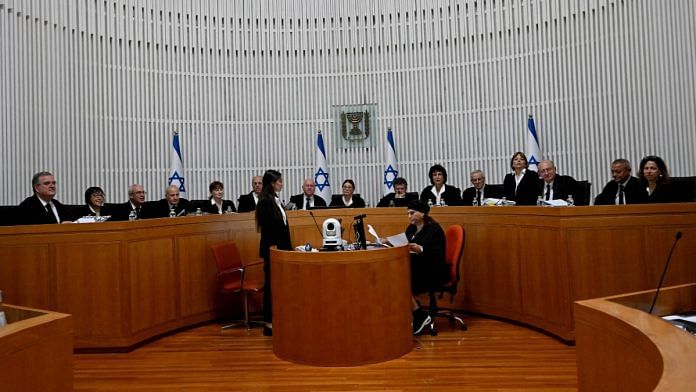New Delhi: Israel’s top court Monday struck down a key component of the government’s controversial judicial overhaul that sought to deprive the country’s Supreme Court of its power to declare decisions of the executive it saw as “unreasonable”, as void.
According to the Times of Israel, in a decision of eight votes to seven, the apex court for the first time nullified one of Israel’s 14 quasi-constitutional “Basic Laws” — laws that “may, in the future, be incorporated into a formal written constitution of the State of Israel”.
The man behind the contentious judicial reform, Justice Minister Yariv Levin, criticised the court’s landmark decision Tuesday, noting that the ruling would not “stay our hand”. He accused the Supreme Court justices of “taking into their hands all the authorities that are supposed to be divided between the three branches of government in a democracy”.
This ruling signalled the latest development in a year-long dispute between the Netanyahu administration and the judiciary that divided Israeli society and led to massive anti-government protests.
While the court was almost split on its decision to strike down the ‘reasonableness limitation law’, in its judgement it asserted that it has the right to annul “Basic Laws” in specific situations where they undermine the foundation of Israel as a democratic country.
Outgoing Supreme Court president Esther Hayut, who ruled in favour of striking down the law, argued that it “does the most severe harm possible to the principle of the separation of powers and the principle of the rule of law,” and thus constitutes “a severe blow to two of the most explicit characteristics of Israel as a democratic state”.
Of the 15 justices, 13 wrote in their opinions that they believed the apex court had the power to review the “Basic Laws” and intervene.
What was the ‘reasonableness law’
Israel’s parliament, the Knesset, passed the ‘reasonableness limitation law’, amending the ‘Basic Law: The Judiciary’ last July. This legislation was part of the Netanyahu government’s multifaceted effort to ‘reform’ the judiciary.
Israel has no written constitution but rather a set of 14 quasi-constitutional laws, called the “Basic Laws”, many of which can only be amended by a simple majority in the Knesset.
The ‘reasonableness limitation law’ sought to restrict courts in the country, including the apex court, from discussing and ruling on government and ministerial decisions on the grounds of judicial standard of reasonableness.
On the whole, the law sought to deprive the judiciary of its power to declare a government decision “unreasonable” and to curb its ability to protect minority rights from the governing political majority.
This law was passed after the Netanyahu-led government reconsidered its earlier judicial reform plan which included a bill that would allow the Knesset to enact laws that have been declared unconstitutional by the Supreme Court and a second bill that would have given the government near-total control over almost all judicial appointments.
This legislation was the only element of the Netanyahu-Levin judicial overhaul plan passed by the Knesset so far. Its enactment caused protests across Israel, with many army reservists also threatening to resign in protest. Even within government, Defence Minister Yoav Gallant had publicly criticised these reforms, leading to a brief dismissal.
Oppn hails verdict, Likud calls it ‘unfortunate’
Netanyahu’s Likud party called the Supreme Court’s decision “unfortunate” at a time when “IDF (Israel Defence Forces) soldiers from right and left are fighting and endangering their lives” — a reference to the war in Gaza. “The court’s decision contradicts the people’s desire for unity, particularly at a time of war,” Likud said in a statement Monday.
Knesset Speaker Amir Ohana noted: “It is self-evident that the Supreme Court has no authority to annul Basic Laws. Even more self-evident is that we cannot engage in this while the war is at its peak.”
“This creates a situation in which it is impossible to legislate even a Basic Law or take any decision in the Knesset or the government without the agreement of the Supreme Court, depriving millions of citizens of their voice,” lamented Justice Minister Levin.
However, other leaders like former defence minister Benny Gantz, who is chairman of the ruling National Unity alliance and a member of Netanyahu’s war cabinet, welcomed the ruling, stating, “The ruling must be respected, and the lesson from conduct in the past year must be learned. We are brothers, and have a shared fate.”
He added that after the war with Hamas, Israeli society and leaders will have to strive for broad agreement on “relations between branches of government and legislate a ‘Basic Law: Legislation’ that will anchor the status of Basic Laws”. Gantz had previously led protests against the Netanyahu government’s judicial overhaul plans.
Opposition leader Yair Lapid also offered his full support to the ruling, saying the top court’s ruling “ends a difficult year of conflict that tore us apart from within and led to the worst disaster in our history”.
“The source of power of Israel, the basis for Israeli strength, is our being a Jewish, democratic, liberal, law-abiding state. If the government restarts the fight over the High Court, they’ve learned nothing,” he argued.
Labor Party chief Merav Michaeli said, “Even the conservative judges ruled today that the court has the authority to review and invalidate Basic Laws. There is no clearer statement to all the wreckers and destroyers of democracy. Israeli democracy will not give up.”
(Edited by Amrtansh Arora)
Also Read: As Gaza war rages on, Machiavelli would’ve warned Netanyahu. Enemies can learn from warfare



